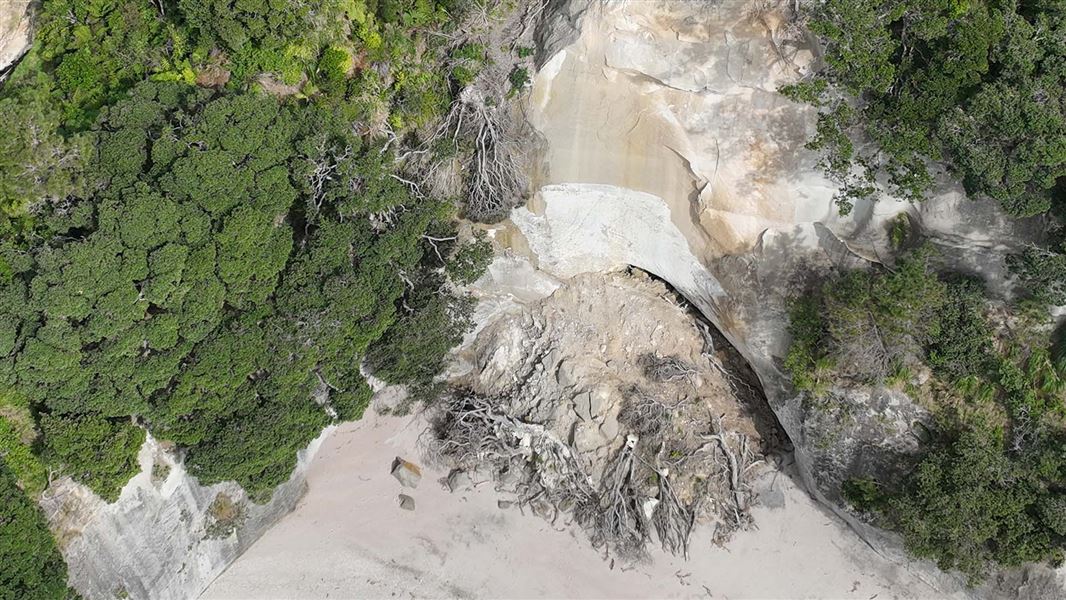
Introduction
Read about our work to restore the Mautohe Cathedral Cove after the extreme weather events of summer 2022-23.Mautohe Cathedral Cove Track reopened on 1 December 2024.
Mautohe Cathedral Cove Track
Temporary walking access has been reinstated to Mautohe Cathedral Cove following damage from extreme weather events in summer 2022-23.
More work is needed to deliver a long-term solution that can better withstand the impacts of climate change and land movement and acknowledge the area’s rich cultural heritage.
A total of $5M has been allocated from the International Visitor Conservation and Tourism Levy (IVL) to support restoring and maintaining access to Mautohe Cathedral Cove.
How we manage visitor risk
There are known geological/landslide risks at Mautohe Cathedral Cove. We have an important responsibility to ensure visitors are safe.
To manage those risks, we’ve adopted the Trigger Response Action Plan (TARP). TARP guides how we manage the track and visitor safety when the Coromandel has experienced heavy rain, strong winds or a seismic event (earthquake).
The triggers are:
- rainfall volumes of 50 mm or more in 24 hours
- earthquakes of magnitude 5 or higher in the North Island
- strong winds with an average speed of 35 km/h over 24 hours or gusts of 70 km/h or higher. Or reports of damage, for example, rockfall, treefall, or storm damage
If any of these triggers are identified, our staff will inspect the main Mautohe Cathedral Cove track and its surrounds to assess risk.
The inspections will help us make decisions on track management. This may include closure. Any closure of the track will be communicated through DOC channels and to stakeholders.
Date: 04 December 2024
4 December 2024 update
Temporary walking access
Of the $5 m allocated from the IVL, $1.4m was focused on restoring walking access in time for summer 2024/25.
This access is a temporary solution as more time and resources are needed to design a track that can withstand the area’s weather and unstable geology over the long-term. The temporary reroute may not last through extreme storm events.
Timeframe
The track sustained significant damage during extreme weather events including cyclones Hale and Gabrielle in Summer 2022-2023. The land needed time to dry out properly before thorough assessments and repairs could begin.
We worked through a complex set of issues to enable a work programme to be put in place. These included land management responsibilities (land stability and rockfall challenges, health and safety considerations and management of visitor pressure) and treaty settlement requirements.
Once the work programme and funding were in place, we worked at pace to:
- fulfil heritage and statutory requirements,
- secure contractors,
- remove hazardous trees,
- build the track and facilities,
- develop risk mitigations and signage, and
- put in place a plan for this summer to manage the peak season visitation, including summer rangers to help with traffic management.
Toilets
The funding also included the installation of a four-pan toilet block which, for practical, safety and environmental reasons, could no longer be located on the beach itself. The previous toilets were in a rockfall zone, other locations outside the rockfall zone are within the tidal zone - where human waste poses a risk to the marine environment and reserve.
We have relocated toilets as close to the beach as possible (10-15 minutes’ away). Visitors should plan ahead and use the facilities provided to respect the area’s fragile environment and other visitors.
Visitor safety
The landscape of the Mautohe Cathedral Cove reserve is naturally unstable. There will always be a risk of rockfall and landslides at this site.
We have taken measures, including updating signage and visitor and stakeholder information, to ensure people are aware of the risks and how to keep themselves safe. There may be times, such as heavy rain events, when we need to temporarily close walking access to protect visitors.
We know the most likely areas of instability and have put landslide monitoring tiltmeters on the reserve. This allows us to see in real time if the land is moving during or after weather events, informing our management approach and future infrastructure decisions.
Longer term walking access
We will work with Ngāti Hei, the community, and stakeholders to identify a long-term solution for access to Mautohe Cathedral Cove and to develop a visitor management plan.
1 December 2024 update
Mautohe Cathedral Cove reopens to walkers
The Government has delivered on its promise to restore public walking access to the popular Mautohe Cathedral Cove in time for Summer 2024-2025.
The walking track to the famous Coromandel beach - renowned for its natural rock arch feature and protected waters – was severely damaged by extreme weather events including Cyclones Hale and Gabrielle in Summer 2022-2023.
Speaking from Mautohe Cathedral Cove, where he officially reopened the track today, Minister of Conservation Tama Potaka thanked staff from the Department of Conservation Te Papa Atawhai, tangata whenua Ngāti Hei, the local community and civic leaders, contractors and all others who worked to get the track open for public enjoyment.
Read the full media release.
Mautohe Cathedral Cove reopens to walkers: Media release 1 Dec 2024